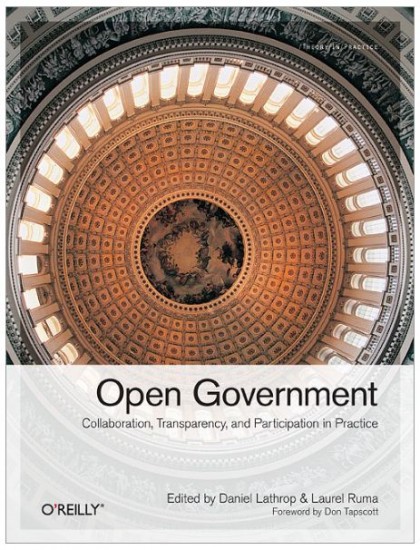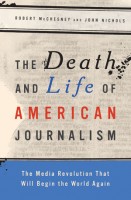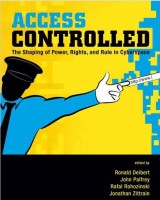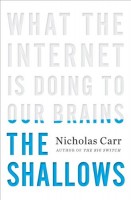 If you are an avid reader of everything Clay Skirky pens — and I’m going to assume most readers of this blog are — then the chapters you’ll find in his new book, Cognitive Surplus: Creativity and Generosity in a Connected Age, will seem quite familiar. In fact, as I was working my way through the book, I was reminded of a piece of advice my old boss David Boaz gave me once (but that I foolishly ignored several times over): Sometimes there’s no need to write a book when a good article with suffice.
If you are an avid reader of everything Clay Skirky pens — and I’m going to assume most readers of this blog are — then the chapters you’ll find in his new book, Cognitive Surplus: Creativity and Generosity in a Connected Age, will seem quite familiar. In fact, as I was working my way through the book, I was reminded of a piece of advice my old boss David Boaz gave me once (but that I foolishly ignored several times over): Sometimes there’s no need to write a book when a good article with suffice.
We’ve seen or heard most of the material in Cognitive Surplus many times before and I think we got the point: The Internet and digital technology has freed up an enormous amount of time for more productive / worthwhile endeavors that was previously squandered — most by too much coach potato television consumption. He spells out his thesis a bit more eloquently on pg. 63:
The harnessing of our cognitive surplus allows people to behave in increasingly generous, public, and social ways, relative to their old status as consumers and couch potatoes. The raw material of this change is the free time available to us, time we can commit to projects that range from the amusing to the culturally transformative. […] Flexible, cheap, and inclusive media now offers us opportunities to do all sorts of things we once didn’t do. In the world of “the media,” we were like children, sitting quietly at the edge of a circle and consuming whatever the grown-ups in the center of the circle produced. That has given way to a world in which most forms of communication, public and private, are available to everyone in some form. (p. 63)
Shirky spends 200+ pages here trying to bolster that claim in various ways. But, again, I’m not sure he needed to. I think he had most of us at “hello.” The notion that the Net has made us and our culture better off seems fairly uncontroversial to most of us. Of course, one could argue, as Jonah Lehrer or Wired Magazine has, that “the consumption of culture is not always worthless,” and that just because the Internet and digital technologies have empowered the audience to talk back doesn’t mean they’ll have anything all that much more interesting to say. Lehrer’s critique of Shirky continues: Continue reading →
 Those of you interested in transparency and “Government 2.0” issues will absolutely want to pick up Open Government: Collaboration, Transparency, and Participation in Practice, a terrific collection of 34 essays edited by Daniel Lathrop and Laurel Ruma. Much like Access Controlled, the collection of essays on global Internet filtering and censorship that I praised here last month, Open Government is a resource like no other in its field. It offers an amazing diversity of viewpoints covering virtual every aspect of the debate over transparency and open government.
Those of you interested in transparency and “Government 2.0” issues will absolutely want to pick up Open Government: Collaboration, Transparency, and Participation in Practice, a terrific collection of 34 essays edited by Daniel Lathrop and Laurel Ruma. Much like Access Controlled, the collection of essays on global Internet filtering and censorship that I praised here last month, Open Government is a resource like no other in its field. It offers an amazing diversity of viewpoints covering virtual every aspect of the debate over transparency and open government.
The collection was published by O’Reilly Media and Tim O’Reilly himself has one of the best chapters in the book on “Government as a Platform.” “The magic of open data is that the same openness that enables transparency also enables innovation, as developers build applications that reuse government data in unexpected ways.” (p. 25) This explains why in their chapter on “Enabling Innovation for Civic Engagement,” David G. Robinson, Harlan Yu, and Edward W. Felten, of the Center for Information Technology Policy at Princeton University, speak of “a new baseline assumption about the public response to government data: when government puts data online, someone, somewhere will do something valuable and innovative with it.” (p.84) “By publishing its data in a form that is free, open, and reusable,” they continue, “government will empower citizens to dream up and implement their own innovative ideas of how to best connect with their governments.” (p. 89)
Indeed, just think about some of the many exciting sites and projects (both public and private) that have been developed thanks to government data becoming more accessible in recent years. Here’s a short list of some of the best: Continue reading →
 I’ve been so busy trying to cover breaking developments related to Washington’s new efforts to “save journalism” (FTC) and steer the “future of media” (FCC) — see all my recent essays & papers here — that I forgot to do a formal book review of the book that is partially responsible for whipping policymakers into a lather about this issue: The Death and Life of American Journalism, the media-takeover manifesto by the neo-Marxist media scholar Robert W. McChesney and Nation editor John Nichols. Their book is horrifying in its imperial ambitions since it invites the government become the High Lord and Protector of the Fourth Estate. [For an in-depth look at all of McChesney’s disturbing views on these issues, see: “Free Press, Robert McChesney & the “Struggle” for Media.”] Anyway, I put together a formal review of the book for City Journal. It’s online here and I’ve also pasted it down below.
I’ve been so busy trying to cover breaking developments related to Washington’s new efforts to “save journalism” (FTC) and steer the “future of media” (FCC) — see all my recent essays & papers here — that I forgot to do a formal book review of the book that is partially responsible for whipping policymakers into a lather about this issue: The Death and Life of American Journalism, the media-takeover manifesto by the neo-Marxist media scholar Robert W. McChesney and Nation editor John Nichols. Their book is horrifying in its imperial ambitions since it invites the government become the High Lord and Protector of the Fourth Estate. [For an in-depth look at all of McChesney’s disturbing views on these issues, see: “Free Press, Robert McChesney & the “Struggle” for Media.”] Anyway, I put together a formal review of the book for City Journal. It’s online here and I’ve also pasted it down below.
_____________________
A Media Welfare State?
by Adam Thierer
Imagine a world of “post-corporate” newsrooms, where the state serves as the primary benefactor of the Fourth Estate. Billions flow from bureaucracies to media entities and individual journalists in the name of sustaining a “free press.” And this new media welfare state is funded by steep taxes on our mobile phones, broadband connections, and digital gadgets.
Sound Orwellian? Well, it’s the blueprint for a press takeover drawn up by Robert W. McChesney and John Nichols in their new book, The Death and Life of American Journalism. McChesney, the prolific neo-Marxist media scholar who teaches at the University of Illinois at Urbana-Champaign, and Nichols, a journalist with The Nation, aren’t shy about their intentions. Along with Free Press, the absurdly misnamed regulatory activist group they co-founded, McChesney and Nichols outline a self-described “radical” agenda for what they hope will become a media “revolution.” And, shockingly, some folks in the Obama administration are listening. Continue reading →
 On this week’s episode of the podcast, Clay Shirky, adjunct professor at New York University’s Interactive Telecommunications Program, discusses his new book, Cognitive Surplus: Creativity and Generosity in a Connected Age. Shirky talks about social and economic effects of Internet technologies and interrelated effects of social and technological networks. In this podcast he discusses social production, open source software, Wikipedia, defaults, Facebook, and more.
On this week’s episode of the podcast, Clay Shirky, adjunct professor at New York University’s Interactive Telecommunications Program, discusses his new book, Cognitive Surplus: Creativity and Generosity in a Connected Age. Shirky talks about social and economic effects of Internet technologies and interrelated effects of social and technological networks. In this podcast he discusses social production, open source software, Wikipedia, defaults, Facebook, and more.
Related Readings
Do check out the interview, and consider subscribing to the show on iTunes. Past guests have included Nick Carr on what the internet is doing to our brains, Gina Trapani and Anil Dash on crowdsourcing, James Grimmelman on online harassment and the Google Books case, Michael Geist on ACTA, Tom Hazlett on spectrum reform, and Tyler Cowen on just about everything.
So what are you waiting for? Subscribe!
 Faithful readers know of my geeky love for tech policy books. I read lots of ’em. There’s a steady stream of Amazon.com boxes that piles up on my doorstop some days because my mailman can’t fit them all in my mailbox. But I go pretty hard on all the books I review. It’s rare for me pen a glowing review. Occasionally, however, a book will come along that I think is both worthy of your time and which demands a place on your bookshelf because it is such an indispensable resource. Access Controlled: The Shaping of Power, Rights, and Rule in Cyberspace is one of those books.
Faithful readers know of my geeky love for tech policy books. I read lots of ’em. There’s a steady stream of Amazon.com boxes that piles up on my doorstop some days because my mailman can’t fit them all in my mailbox. But I go pretty hard on all the books I review. It’s rare for me pen a glowing review. Occasionally, however, a book will come along that I think is both worthy of your time and which demands a place on your bookshelf because it is such an indispensable resource. Access Controlled: The Shaping of Power, Rights, and Rule in Cyberspace is one of those books.
Smartly organized and edited by Ronald J. Deibert, John G. Palfrey, Rafal Rohozinski, and Jonathan Zittrain, Access Controlled is essential reading for anyone studying the methods governments are using globally to stifle online expression and dissent. As I noted of their previous edition, Access Denied: The Practice and Policy of Global Internet Filtering, there is simply no other resource out there like this; it should be required reading in every cyberlaw or information policy program.
The book, which is a project of the OpenNet Initiative (ONI), is divided into two parts. Part 1 of the book includes six chapters on “Theory and Analysis.” They are terrifically informative essays, and the editors have made them all available online here (I’ve listed them down below with links embedded). The beefy second part of the book provides a whopping 480 pages(!) of detailed regional and country-by-country overviews of the global state of online speech controls and discuss the long-term ramifications of increasing government meddling with online networks.
In their interesting chapter on “Control and Subversion in Russian Cyberspace,” Deibert and Rohozinski create a useful taxonomy to illustrate the three general types of speech and information controls that states are deploying today. What I find most interesting is how, throughout the book, various authors document the increasing movement away from “first generation controls,” which are epitomized by “Great Firewall of China”-like filtering methods, and toward second- and third-generation controls, which are more refined and difficult to monitor. Here’s how Deibert and Rohozinski define those three classes (or “generations”) of controls: Continue reading →
 Last Friday afternoon, as I was leaving my house to en route to the airport with the family for a short vacation, Nicholas Carr’s latest book, The Shallows: What the Internet is Doing to Our Brains, arrived in my mailbox. I grabbed it, jumped in the car, flipped it open during the drive to Dulles Airport (don’t worry, the wife was driving), and began devouring it. I say “devour” because once I started reading it, I didn’t stop. I was wholeheartedly absorbed in the text from start to finish.
Last Friday afternoon, as I was leaving my house to en route to the airport with the family for a short vacation, Nicholas Carr’s latest book, The Shallows: What the Internet is Doing to Our Brains, arrived in my mailbox. I grabbed it, jumped in the car, flipped it open during the drive to Dulles Airport (don’t worry, the wife was driving), and began devouring it. I say “devour” because once I started reading it, I didn’t stop. I was wholeheartedly absorbed in the text from start to finish.
I tell you all this not just because Carr’s book is that good, but because according to the thesis he sets forth in The Shallows, fewer and fewer people are likely to be engaged in such contemplative, deep reading activities due to the highly distractive nature of the Internet and digital technologies. “With the exception of alphabets and number systems, the Net may well be the single most powerful mind-altering technology that has ever come into general use,” Carr claims. “At the very least, it’s the most powerful that has come along since the book.” (p. 116) The Net and multimedia “strains our cognitive abilities, diminishing our learning and weakening our understanding,” he says. (p. 129) And we have no one to blame for this mess but ourselves:
We want to be interrupted, because each interruption brings us a valuable piece of information… And so we ask the Internet to keep interrupting us, in ever more and different ways. We willingly accept the loss of concentration and focus, the division of our attention and the fragmentation of our thoughts, in return for the wealth of compelling or at least diverting information we receive. Tuning out is not an option many of us would consider. (p. 133-4)
Although, ultimately, Carr doesn’t quite convinced me that “The Web is a technology of forgetfulness” (p. 193), he has made a powerful case that its effects may not be as salubrious as many of us have assumed. Continue reading →
Faithful readers know of my geeky love of tech policy books [here are my “best of” lists for 2008 & 2009], and the intriguing battle taking place today between Internet optimists and pessimists in particular. One of the things that I noticed when I was putting together my compendium, “The Digital Decade’s Definitive Reading List: Internet & Info-Tech Policy Books of the 2000s,” is that there are up years and down years. For example, there weren’t a lot of big tech policy titles in 2000 or 2005. By contrast, 2001, 2006 and 2008 were monster years. I suppose that’s the case with any genre, of course.
Anyway, I was beginning to think that 2010 was shaping up to be one of those slow years, with Jaron Lanier’s You Are Not a Gadget being the only major release so far this year. [See my review of it here.] But there are some very important titles on the way that are worth picking up. I’ve already pre-ordered most of these and am looking forward to reviewing them all soon:
Please let me know others that I may be missing. [Note: Most of the books I’ve been reading this year have more to do with the future of media, the press, journalism, etc. It’s been a big year for books like that. For example, McChesney & Nichols’ The Death and Life of American Journalism; Lee Bollinger’s Uninhibited, Robust, and Wide-Open: A Free Press for a New Century; and Bob Garfield’s The Chaos Scenario. But it’s not clear any of these books belong in the “info-tech policy” genre, although they all have something to say about the impact of the Internet and digital technology on the media and journalism. So, who knows, maybe I will add them to my end of year list.]
Over at Convergences I consider the writings of Polk Wagner, beginning thus:
Polk Wagner has written some worthwhile papers on law and technology. I heartily recommend those that support points on which we agree, such as The Perfect Storm: Intellectual Property and Public Values, 73 Fordham L. Rev. 1107. 2005. This paper notes how the de facto balance between copyright and fair use has shifted over the years, and that in key respects copyright has lost, not gained, ground, and also noting that fair use is far from being the only key conceptual or practical limit on copyright.
But his paper “On Software Regulation,” is a bit muddled. It may not be Professor Wagner’s fault, for the article was written following up on the “code is law” meme, which is at bottom a rather unhelpful observation. If “code is law” then so is everything else—the laws of physics, architecture, road design, engineering, biology, the laws of physics, religion, education, insect swarming patterns, families, and so on. All of these things affect human behavior and shape and regularize society. My complaint with “code is law” is not that is not true, in a sense—but that it is very unhelpful in understanding any real problem. Many institutions and systems affect human behavior, but they do so in different ways. It is understanding the differences that will be the key to resolving any serious human problems.
Consistent with this, Professor Wagner begins by noting that “code is law” tells us nothing about how code and law relate. But he restates the view that software code constitutes regulation. Software “regulates” in the sense that it makes human conduct more regular and affects the public. But is it really much like “regulation” enacted through a legal process by Congress or the FCC, or even like law described by courts? Certainly not. But the paper’s description of the differences is oddly incomplete.
For the remainder, visit Convergences here.
Michiko Kakutani has a very interesting essay in the New York Times entitled, “Texts Without Contexts,” which does a nice job running through the differences between Internet optimists and pessimists, a topic I’ve spent a great deal of time writing about here. (See: “Are You An Internet Optimist or Pessimist? The Great Debate over Technology’s Impact on Society.”) She surveys many of the books I’ve reviewed and discussed here before by authors such as Neil Postman, Nick Carr, Cass Sunstein, Andrew Keen, Mark Helprin, Jaron Lanier, and others. She notes:
These new books share a concern with how digital media are reshaping our political and social landscape, molding art and entertainment, even affecting the methodology of scholarship and research. They examine the consequences of the fragmentation of data that the Web produces, as news articles, novels and record albums are broken down into bits and bytes; the growing emphasis on immediacy and real-time responses; the rising tide of data and information that permeates our lives; and the emphasis that blogging and partisan political Web sites place on subjectivity.
At the same time it’s clear that technology and the mechanisms of the Web have been accelerating certain trends already percolating through our culture — including the blurring of news and entertainment, a growing polarization in national politics, a deconstructionist view of literature (which emphasizes a critic’s or reader’s interpretation of a text, rather than the text’s actual content), the prominence of postmodernism in the form of mash-ups and bricolage, and a growing cultural relativism that has been advanced on the left by multiculturalists and radical feminists, who argue that history is an adjunct of identity politics, and on the right by creationists and climate-change denialists, who suggest that science is an instrument of leftist ideologues.
It’s a great debate, but a very controversial one, of course. Anyway, go read her entire essay.
So, do I need to remind everyone of my ongoing rants about Jonathan Zittrain’s misguided theory about the death of digital generativity because of the supposed rise of “sterile, tethered” devices? I hope not, because even I am getting sick of hearing myself talk about it. But here again anyway is the obligatory listing of all my tirades: 1, 2, 3, 4, 5, 6, 7, 8 + video and my 2-part debate with Lessig and him last year.
You will recall that the central villain in Zittrain’s drama The Future of the Internet and How to Stop It is big bad Steve Jobs and his wicked little iPhone. And then, more recently, Jonathan has fretted over those supposed fiends at Facebook. Zittrain’s worries that “we can get locked into these platforms” and that “markets [will] coalesce [around] these tamer gated communities,” making it easier for both corporations and governments to control us. More generally, Zittrain just doesn’t seem to like that some people don’t always opt for the same wide open general purpose PC experience that he exalts as the ideal. As I noted in my original review of his book, Jonathan doesn’t seem to appreciate that it may be perfectly rational for some people to seek stability and security in digital devices and their networking experiences—even if they find those solutions in the form of “tethered appliances” or “sterile” networks, to use his parlance.
Every once and awhile I find a sharp piece by someone out there who is willing to admit that they see nothing wrong with such “closed” platforms or devices, or they even argue that those approaches can be superior to the more “open” devices and platforms out there. That’s the case with this Harry McCracken rant over at Technologizer today with the entertaining title, “The Verizon Droid is a Loaf of Day-Old Bread.” McCracken goes really hard on the Droid — which hurts because I own one! — and I’m not sure I entirely agree with his complaint about it, but what’s striking is how it represents the antithesis of Zittrainianism: Continue reading →
 If you are an avid reader of everything Clay Skirky pens — and I’m going to assume most readers of this blog are — then the chapters you’ll find in his new book, Cognitive Surplus: Creativity and Generosity in a Connected Age, will seem quite familiar. In fact, as I was working my way through the book, I was reminded of a piece of advice my old boss David Boaz gave me once (but that I foolishly ignored several times over): Sometimes there’s no need to write a book when a good article with suffice.
If you are an avid reader of everything Clay Skirky pens — and I’m going to assume most readers of this blog are — then the chapters you’ll find in his new book, Cognitive Surplus: Creativity and Generosity in a Connected Age, will seem quite familiar. In fact, as I was working my way through the book, I was reminded of a piece of advice my old boss David Boaz gave me once (but that I foolishly ignored several times over): Sometimes there’s no need to write a book when a good article with suffice.





 The Technology Liberation Front is the tech policy blog dedicated to keeping politicians' hands off the 'net and everything else related to technology.
The Technology Liberation Front is the tech policy blog dedicated to keeping politicians' hands off the 'net and everything else related to technology.